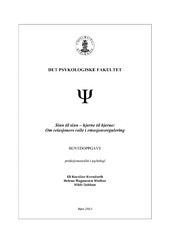Sinn til sinn - hjerne til hjerne: Om relasjoners rolle i emosjonsregulering
Master thesis
Permanent lenke
https://hdl.handle.net/1956/7816Utgivelsesdato
2013-11-24Metadata
Vis full innførselSamlinger
- Faculty of Psychology [527]
Sammendrag
Emotion regulation difficulties are a central phenomenon in mental illness. Emotion regulation involves the ability to increase and decrease physiological activation, affect and feeling. The ability to regulate ones emotion emerges in interaction with others. Being able to flexibly change between healthy self- and other-regulation is thought to represent optimal functioning of emotion regulation. Attachment theory and neuroscience can inform our understanding of how the development of these skills occurs. Early relational experiences affect the maturation, differentiation and integration of brain structures involved in emotion regulation. Meanwhile, the brain remains malleable throughout life, pointing to human interaction as a continuing potential source of change. The therapeutic relationship may serve as a well suited setting for further development of this ability. The matter of interest in this paper is how attachment theory and neuroscience can enrich our understanding of the implicit and explicit role of the therapeutic relationship in strengthening the patients' ability to flexibly regulate emotion. A case description and dialogue excerpts are used to illustrate psychotherapeutic work on emotion regulation. Implications for the caregiver's role in mental health, the education of psychologists, psychotherapeutic practice and neuroscientific contributions are discussed. Vansker med emosjonsregulering er et sentralt fenomen i mange psykiske lidelser. Emosjonsregulering omhandler hvordan en person kan opp- og nedregulere sin fysiologiske aktivering, sin affekt og sine følelser. Evnen til emosjonsregulering utvikles i samspill med andre. En optimal emosjonsregulering innebærer å fleksibelt kunne veksle mellom å regulere seg hensiktsmessig på egenhånd og ved hjelp av andre. Tilknytningsteori og nevrovitenskap kan benyttes til å forstå hvordan utviklingen av disse evnene finner sted. Tidlige relasjonelle erfaringer påvirker modningen, differensieringen og integreringen av ulike hjernestrukturer involvert i emosjonsregulering. Hjernen forblir imidlertid endringsdyktig hele livet, og mellommenneskelige samspill kan dermed potensielt virke endringsgivende også i voksen alder. Terapirelasjonen kan dermed tenkes å utgjøre en velegnet arena for videreutvikling av denne evnen. Denne oppgaven tar for seg hvordan vi ved hjelp av kunnskap fra tilknytningsteori og nevrobiologi kan forstå relasjonens implisitte og eksplisitte rolle i terapeutisk arbeid med å styrke pasientens evne til fleksibel emosjonsregulering. Kasus og vignetter benyttes for å illustrere psykoterapeutisk arbeid med emosjonsregulering. Implikasjoner for omsorgsgivers ansvar i psykisk helse, psykologutdanningen, utøvelsen av psykoterapi og nevrovitenskapens bidrag til feltet diskuteres.
